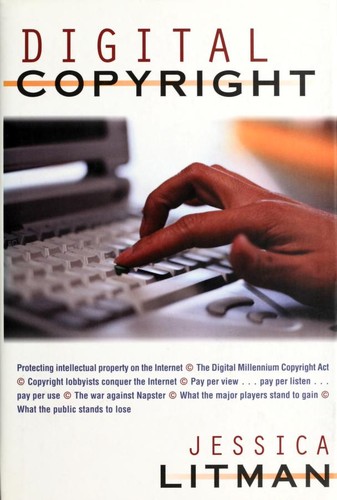nemobis ha recensito Digital Copyright di Jessica D. Litman
Review of 'Digital Copyright' on 'Goodreads'
4 stelle
Err:509

Copertina rigida, 208 pagine
lingua English
Pubblicato il 10 Luglio 2001 da Prometheus Books.
In 1998, copyright lobbyists succeeded in persuading Congress to enact laws greatly expanding copyright owners' control over individuals' private uses of their works. The efforts to enforce these new rights have resulted in highly publicized legal battles between established media, such as major record labels and motion picture studios, and upstart Internet companies, such as MP3.com and Napster.
The general public is used to thinking of copyright (if it thinks of it at all) as marginal and arcane, and it hasn't paid much attention as legislation to expand copyright moved through Congress. But copyright law is central to our society's information policy, and affects what we can read, view, hear, use, or learn.
In this enlightening and well-argued book, law professor Jessica Litman questions whether copyright laws crafted by lawyers and their lobbyists really make sense for the vast majority of us. Should every interaction between ordinary consumers and copyright-protected …
In 1998, copyright lobbyists succeeded in persuading Congress to enact laws greatly expanding copyright owners' control over individuals' private uses of their works. The efforts to enforce these new rights have resulted in highly publicized legal battles between established media, such as major record labels and motion picture studios, and upstart Internet companies, such as MP3.com and Napster.
The general public is used to thinking of copyright (if it thinks of it at all) as marginal and arcane, and it hasn't paid much attention as legislation to expand copyright moved through Congress. But copyright law is central to our society's information policy, and affects what we can read, view, hear, use, or learn.
In this enlightening and well-argued book, law professor Jessica Litman questions whether copyright laws crafted by lawyers and their lobbyists really make sense for the vast majority of us. Should every interaction between ordinary consumers and copyright-protected works be governed by laws drafted without ordinary consumers in mind? Is it practical to enforce such laws, or expect consumers to obey them? Most important, what are the effects of such laws on the exchange of information in a free society? Litman's critique exposes the 1998 copyright law as an incoherent patchwork. She argues for reforms that reflect common sense and the way people actually behave in their daily digital interactions. (front flap)
Err:509